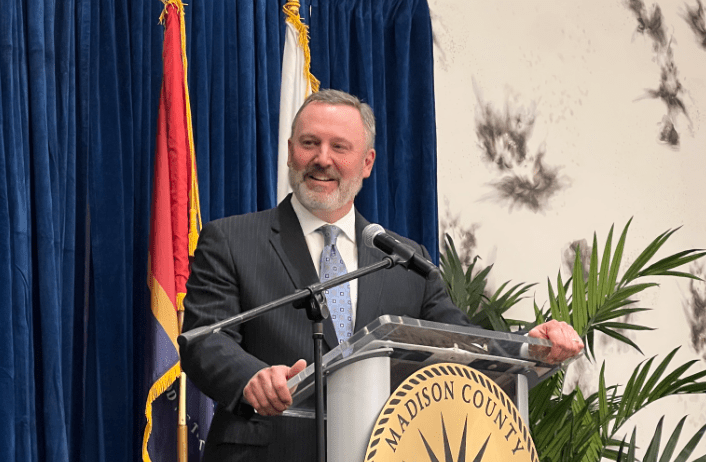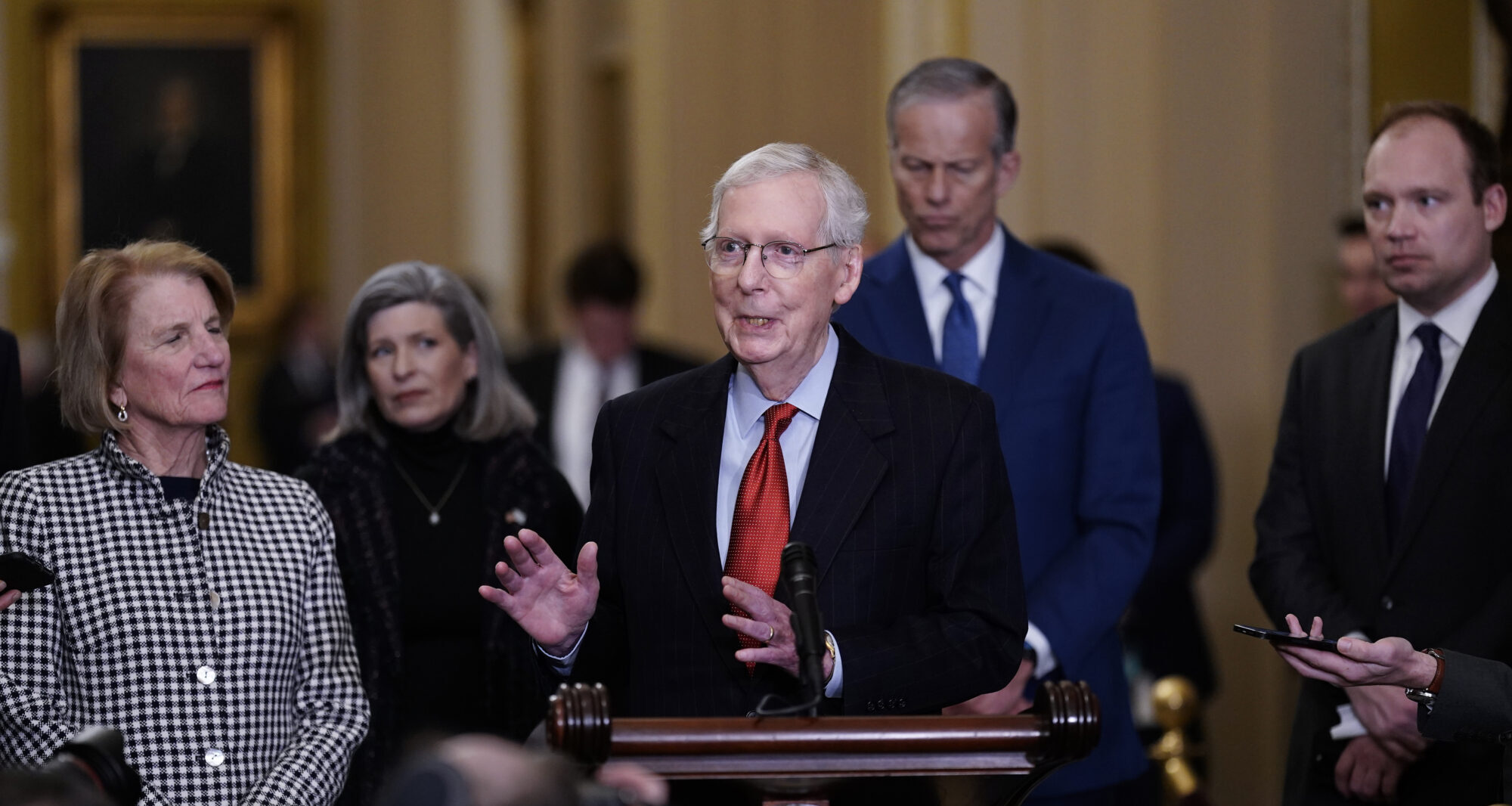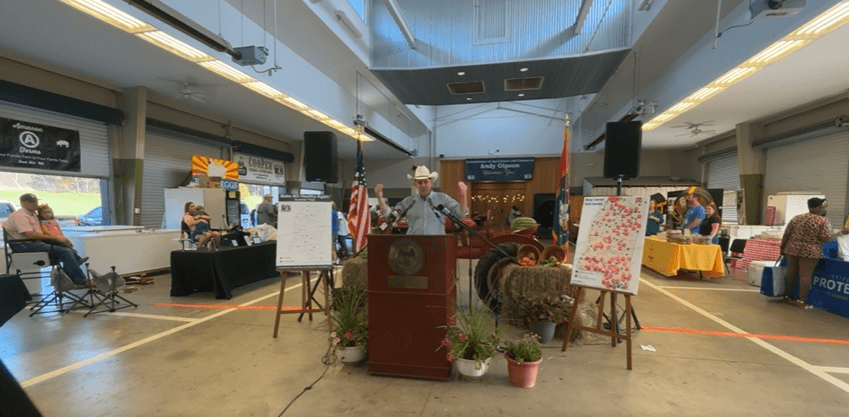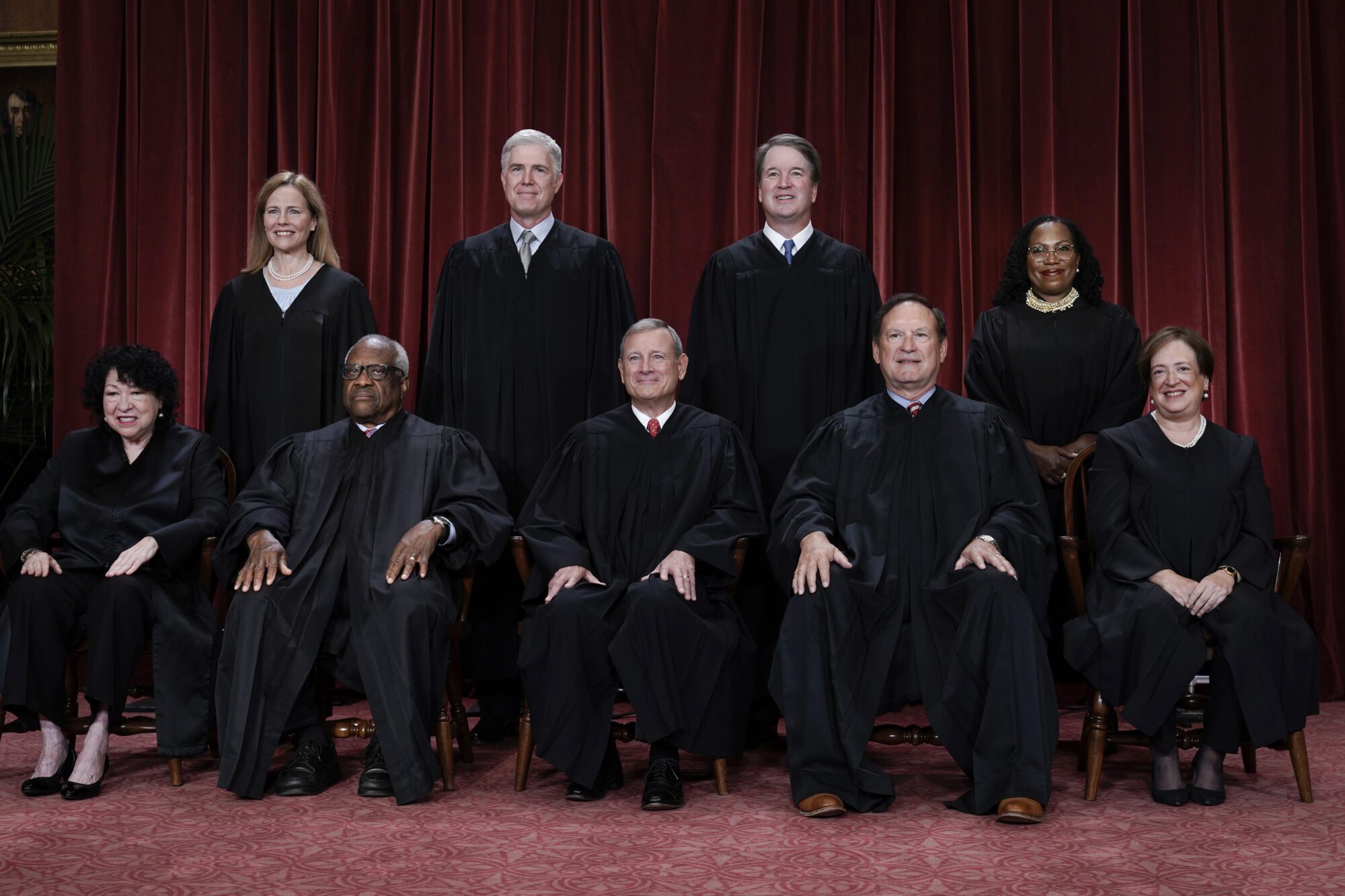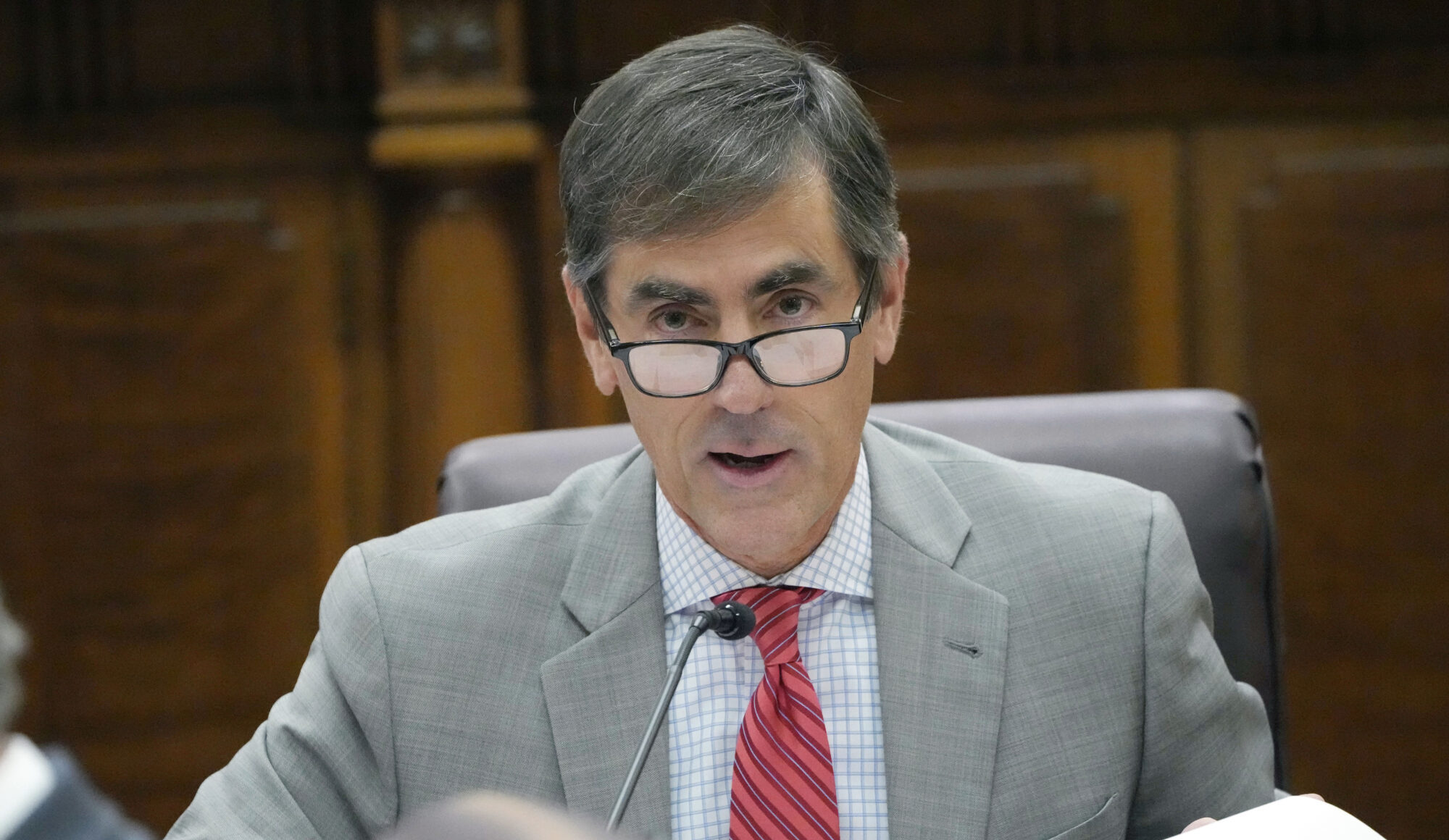
Mississippi State Appropriations Committee Chairman Briggs Hopson, R-Vicksburg, discusses legislation on Project Atlas, an economic development plan for a tech company that intends to spend $10 billion to build two data centers in the central part of the state, to members of the Senate Appropriations Committee at the Mississippi State Capitol in Jackson, Miss., Thursday, Jan. 25, 2024. (AP Photo/Rogelio V. Solis)
State Senator Briggs Hopson told the press Monday that big ticket items up for debate this session, such as PERS and Medicaid, are likely to impact the Magnolia State’s budget.
During the 2024 legislative session, lawmakers will be tasked with setting the state budget for Fiscal Year 2025 which will take effect on July 1, 2024. One of the key players in establishing a working state budget is Senate Appropriations Chairman Senator Briggs Hopson (R).
Hopson moved into the role in 2020 at the beginning of the last term, succeeding Senator Buck Clarke (R), amidst growing concerns related to the COVID pandemic. The Vicksburg attorney previously served as Vice Chairman of the Appropriations Committee under Clarke.
“2020 through 2024 was one heck of a term,” Hopson recalled, speaking at the Stennis Capitol Forum on Monday.
Due to the pandemic, the 2020 legislative session was broken up throughout the year leaving the budget to be set just days before the July 1st deadline.
In the first days of the pandemic, 2020 state revenue estimates were roughly $100-$200 million below expectations, leaving budget analysts at a loss for how to adjust and absorb the impact. Despite initial expectations of budget cuts nearing 15-16%, Senator Hopson said lawmakers were able to set the Fiscal Year 2021 budget with only a 5% cut, after a small spike in revenue.
Through 2021 and 2022, Mississippi revenues increased and American Rescue Plan Act, or ARPA, funds aided in the support of the state budget, allowing lawmakers to make investments in other areas of need.
Over the last two years, the Legislature has approved and Governor Tate Reeves has signed into law historic teacher pay raises, well over $1 billion in infrastructure investments, and the state’s largest individual income tax cut. Senator Hopson said this year, lawmakers are beginning to see the impact of that tax cut and how it has impacted state revenues, some of which was projected. However, overall collections continue to outpace estimates for the current fiscal year.
Other infusions were made to state departments such as Child Protective Services, Department of Health, Department of Transportation, Department of Corrections, and the Department of Human Services. These included pay raises for employees and additional appropriations to run necessary programs.
“The number one objective for every year has been, and will continue to be, to be a good steward of your tax dollars,” said Senator Hopson. “I think everybody expects, if nothing else, if you’re for an education issue or against it, for a healthcare issue or against it, for a finance issue, whatever it is, I think you want us to be a good steward of taxpayer dollars.”
Hopson said as Senate Appropriations Chairman, he does not want any money “hanging around.” It is his intention to return dollars to the taxpayer in ways that directly impact them.
Currently, the Fiscal Year 2024 budget is showing that the state is roughly $100 million over estimate at this point in the calendar year. An uptick in Use Tax and Sales Tax collections are a factor in those positive numbers while Individual Income Tax revenue is below projections, largely as a result of the tax cut package. Hopson said he and other appropriators will continue to monitor the revenue numbers as they work toward the adoption of a state budget during the session.
Topics to Impact FY 2025 Budget
As bills are considered, lawmakers will debate some items of legislation that could amount to large appropriations.
One issue facing the Legislature this year is PERS, the state’s Public Employee Retirement System. PERS reported in the fall that the plan is roughly funded under 60 percent, with an estimated unfunded liability of over $20.5 billion.
“I don’t know anyone that wants to affect our current retirees, let me be clear about that,” said Senator Hopson. “I do think a new tier is on the horizon and I do think there is real concern about the ability for the PERS Board to be able to increase the employer contribution.”
Hopson said the proposed new tier will consist of a new classification for incoming employees. This was a suggestion made by Ray Higgins, Executive Director for PERS, during fall budget hearings.
Also in those hearings, PERS requested that the employer contribution increase by 10% over the next five years. For reference, every 2% increase amounts to roughly $60 million in the state’s budget. This number does not include the impact financially on cities, counties, hospitals and other public employers in the PERS system. Increasing the PERS employer contribution by 10% over 5 years will lead to roughly $300 million in a sustained investment year-to-year from the state’s General Fund.
Nearly 10 years ago, the employer contribution was increased by a small percentage and the retirement time was moved back from 25 years to 30 years. Senator Hopson shared concerns regarding the PERS Board’s unilateral ability to increase the employer contribution without any legislative action. He said this is a topic that comes up frequently among lawmakers as there are always attempts to change that to provide further oversight.
The consequential impact for agencies could include a lack of future pay raises, reduced hiring, and less programing.
Financially, Senator Hopson said investments in healthcare and the changes being suggested to Medicaid could impact the budget as well. The Medicaid Federal Medical Assistance Percentage (FMAP) has decreased, and while there is a “cushion” currently in the department, Hopson said he expects it to take a hit in the coming years.
Other healthcare issues include whether or not lawmakers move on Medicaid expansion, address health insurance plans, and other proposals that would impact hospitals and medical providers taxes.
Legislation Hopson is Proposing
Personally, Senator Hopson said he is looking to file legislation that could impact education and under performing schools. He is proposing a plan to assess and address issues in chronically underperforming schools. Hopson said meetings on the best way to move forward are ongoing.
“We’ve got some school districts in the state that continually underperform,” said Hopson. “We’ve got to do something. We can’t leave it like it is. Even if you bump up for the year, that just is not enough to get you out of some kind of oversight or control.”
Repeating a bill he filed nearly a decade ago, Hopson hopes to improve virtual learning opportunities particularly for school districts who struggle to staff qualified teachers in core subjects.
“It just broke my heart every year, the Superintendent would say, we are X number of teachers away from having certified teachers in classrooms. Stop and think about that. You’re going to put long term subs in classrooms to teach sometimes basic cores subjects,” Hopson said.
The Senator serves as the school board attorney for the South Delta School District. He said these problems were not for a lack of trying but rather are a result of a lack of resources for some areas in the state who cannot find qualified educators. The Legislature has implemented incentives such as bonuses and extra pay for teachers to serve these select areas, but Hopson said in many instances it hasn’t been effective.
The idea is to find a teacher outside of the area in question who can teach core subjects virtually, and potentially provide additional pay for teachers who opt in to teach virtually, the Senator said.
As for infrastructure, the Senate Appropriations Chairman said the state has seen a massive amount of investment in roads and bridges and more in recent years. Senator Hopson expects lawmakers will be working to determine a sustainable solution for communities to rely on as they plan to further address infrastructure issues in their local areas.
